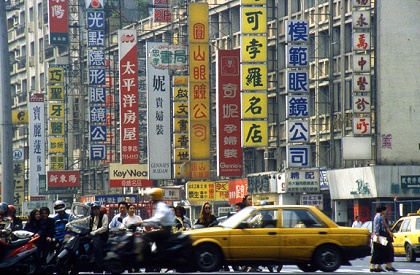After clearly winning the election, Dr Tsai Ing-Wen becomes the first female President of Taiwan. What is her profile? What is her vision for the future of the island?
 A view of Taiwan's capital city, Taipei. / Wikimedia
A view of Taiwan's capital city, Taipei. / Wikimedia
The island of Taiwan held presidential elections on Saturday 16th January. The vote signals a possible change of direction for the island’s future, which is currently self-governing but is widely unrecognised as a nation state.
Mainland China considers the island a province that must be reunited at some point with the mainland, by force if necessary.
The election was won by the pro-independence party, DPP (Democratic Progressive Party) with 56% of the vote.
The DPP, and the KMT (Kuomintang, or Nationalist Party) are the two principle political parties in Taiwan. While the DPP is considered more pro-independence from China, the KMT is considered friendlier towards China.
The KMT received 31% of the vote, which ended the previous eight years of KMT government under President Ma Ying-Jeou. However, Dr Tsai Ing-Wen will not be inaugurated until May.
THE PARTIES
The KMT in Taiwan was originally the Nationalist government in China. The KMT fled to Taiwan, which was its territory after losing the civil war to Communist forces, and have led Taiwan from 1949 until 2000.
The DPP was founded much later than the KMT, in 1986. The Taipei Times states that “from 1986 to 1991... the wording in the party charter was finalized through debate and compromise, and the vision of independence was made crystal clear.”
The new president, Dr. Tsai Ing-Wen is Taiwan’s first female president, and this is also the first time ever that the DPP has held the majority of the seats in Taiwan’s parliament, the Legislative Yuan.
Although Dr Tsai and the DPP won the election by a decided majority, there was a very low turnout of voters, with only 66.2% of the electorate going to the ballots. Polls showed that Tsai Ing-Wen and the DPP were leading decidedly in the polls and voters may have been dissuaded from going to the ballot as the result looked secure.
The Straits Times reported that on the eve of election day, Ms Tsai was greeted by the crowd at a final rally in Taipei calling “President, how do you do?”. Ms Tsai also seemed confident of her victory as she said in her speech, “We are one step away from a new era, to reform Taiwan and unite it. ”
THE KMT’S DEFEAT
Analysts and journalists agree largely that the main reason for the election result is the widespread antipathy towards and unpopularity of the previous president, Ma Ying-Jeou. Mostly because of his increasingly closer economic ties with Mainland China, while increasingly higher ranking officials of both sides met culminating in a meeting between Ma and Chinese President Xi Jinping in the first meeting between leaders of China and Taiwan since 1949.
The Straits Times said “The poll is being held amid worries about Taiwan’s sagging economy and widening rich-poor divide, with many frustrated over outgoing President Ma Ying-jeou’s policies in the last eight years. Voters are also fearful about warming ties with China...”
The South China Morning Post detailed further reasons that the KMT did not win votes, including unemployment rates remaining higher than hoped for and salaries that “grew by about 0.8 per cent a year on average, far lower than the average GDP growth rate of 2.85 per year.”
Time Magazine also said that “...the island’s growth was just 1% last year... with wages stagnant and living costs spiralling.”
The second reason The South China Morning Post stated was infighting within the party and changing the presidential candidate late into the campaign from Hung Hsiu-chu to Eric Chu after a poor performance from Hung.
Finally, the KMT has seen protests over the “backroom” negotiated Cross-Strait Service Trade Agreement with Mainland China, which resulted in the occupation of the Legislative Yuan itself by protesters in the Sunflower Movement as well as protests over education reforms “they say favoured Beijing’s view of the island’s history.” The South China Post concluded that “other controversial domestic issues include electricity and fuel price.”
DPP AND TAIWANESE IDENTITY
The DPP voters include many young people, who traditionally have had an enormous effect on the political landscape, including winning democratic elections in the Wild Lily movement of 1990, and the more recent Sunflower movement.
Increasingly, surveys have shown that people in Taiwan consider themselves Taiwanese, as opposed to Chinese or a mixture of the two and this is especially the case with young people.
In a survey released by the China Youth Corps last year, the Taipei Times reported, “nearly 90 percent of younger people in the nation identify themselves as Taiwanese, with about 40 percent of them wishing to maintain the ‘status quo’ across the Taiwan Strait while retaining the option to declare independence”.
THE K-POP APOLOGY
In this first week after Tsai Ing-Wen was elected Chou Tzu-Yu, a Taiwanese member of a k-pop band came under fire for showing Taiwan’s flag on a Korean TV show, and was forced to apologise, which drew support for her in anger by many Taiwanese, and may have swayed young undecided voters in favour of the DPP in anger at Mainland China.
TAIWAN: NEW TRADE AND REFORM
However, the United States do remain an important ally to Taiwan alongside Japan. The BBC reported “Ms Tsai meanwhile seems to be trying to shore up Taiwan’s alliances and boost trade with its most powerful allies the United States and Japan, to minimise Taiwan’s economic dependence on China and seek security protection.”
Time Magazine said “Tsai wants to look beyond China and diversify trade with the rest of Asia. The President-elect is keen to join the U.S.-led Trans-Pacific Partnership [TPP] free-trade pact... She has also promised a raft of stimulus measures, including five industrial and innovation hubs across the island, a shake-up of the education system, and efforts to boost tourism. And she will encourage Taiwanese businesses that have invested in China to move operations home.”
Meanwhile, Nottingham University’s China Policy Institute Blog predicts that economic distancing from China will not come immediately as Taiwan “is dependent on China in a number of critical areas.”
 A street in the centre of Taipei.
A street in the centre of Taipei.
PROFILE OF TSAI ING-WEN
The new president is a former academic and PhD in law. She has worked under former president Lee Teng-Hui and was head of Taiwan’s Mainland Affairs Council. Under DPP former president Chen Shui-bian, Tsai was vice-premier.
Although, Tsai Ing-Wen has said that she wants to preserve the “status quo” with China, but Beijing seems unconvinced as Xinhua news reported in the wake of the election result that Beijing said, “On major matters of principle including safeguarding national sovereignty and territorial integrity, our will is rock-firm and our attitude is consistent.”
Tsai Ing-Wen has always stressed the importance that democracy is a chief value in Taiwan, and when a barrage of insults was posted on her Facebook page by Chinese netizens, she responded “the greatness of this country lies in how every single person can exercise their right to be himself or herself.”
The Diplomat said “In her victory speech, Tsai said the election results proved the strength of Taiwan’s democracy.”
CHINA, TSAI, AND US ASK FOR PEACE
Mainland China has reiterated their insistence on peace and unity with Taiwan, saying Taiwan should abandon its “hallucinations” about independence as moving towards it would be a “poison”.
The US has also called for peace saying to China’s Taiwan Affairs Office that the United States has an “abiding interest in continued cross-strait peace and stability”. Ms Tsai also warned Beijing “Our democratic system, national identity and international space must be respected. Any forms of suppression will harm the stability of cross-strait relations.”
Mainland China maintains that the “1992 consensus” is the only possible basis for relations with Taiwan, which is an agreement that states that there is only one China with each side free to interpret what that means.
According to the Taipei Times, “The ‘1992 consensus’ [is] a term former [Taiwan] Mainland Affairs Council chairman... admitted to making up in 2000.” Tsai Ing-wen has not supported this concept, saying that it is “not the only option. It’s an option, but not the only option.”
TSAI’S VISION
Dr Tsai wishes to introduce 5 reforms: to ease the difficulty for young people’s financial difficulties in purchasing a home, and receiving pensions; to make the government more transparent and democratic; to reform the legislature to make it more neutral and representative; ensure transitional justice to the indigenous peoples of Taiwan from previous grievances and end malicious political fighting and social antagonism to unite Taiwan “because only with internal solidarity can we have external unity.”

Las opiniones vertidas por nuestros colaboradores se realizan a nivel personal, pudiendo coincidir o no con la postura de la dirección de Protestante Digital.
Si quieres comentar o